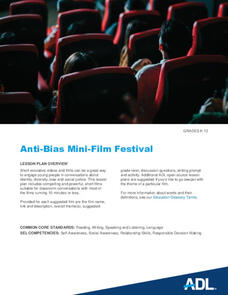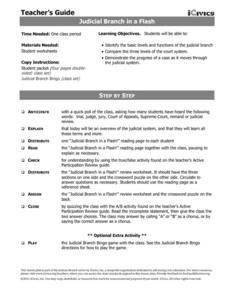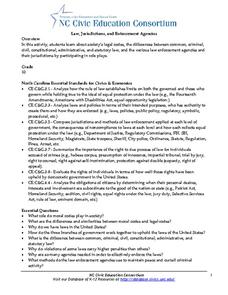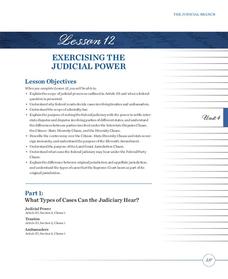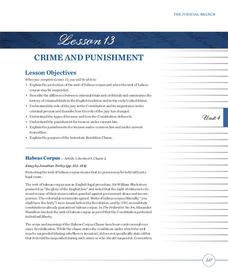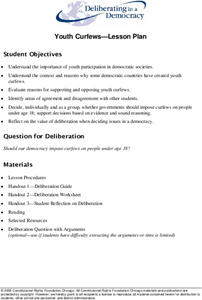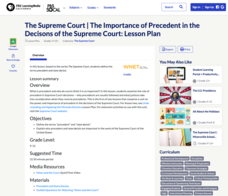Curated OER
Lesson 4: The Judiciary: A Brief Introduction to the Courts System
Focusing on the judicial branch of government, the fourth lesson in this series explores the structure of the US courts system. Beginning with an engaging activity based on the short story The Lady or the Tiger, students go on to examine...
Curated OER
Lesson 5: In the Courtroom: Understanding the Players and the Action
Young lawyers put Goldilocks on trial as they develop an understanding of the legal system in the final lesson of this five-part series. After learning about key terms relating to litigation, learners are assigned roles and reading...
Ohio Center For Law-Related Education
Four Activities: Thurgood Marshall and the Nomination and Confirmation of Federal Judges
The process of nominating and confirming federal judges can sound like a lot of bureaucratic hoops, but a resource breaks down the steps of the Supreme Court nominations in a simpler manner. Learners participate in four activities that...
Stanford University
Lesson Plan: The Children's Crusade and the Role of Youth in the African American Freedom Struggle
Young people played significant roles in the Civil Rights movement. Class members examine the contributions of Barbara Johns, Claudette Colvin, Mary Louise Smith, and the children of Birmingham,...
Anti-Defamation League
Anti-Bias Mini-Film Festival
Imagine a resource that provides all the materials you need to organize a film festival. Imagination becomes a reality with a five-star resource that has done all the work for you. Eight different award-winning short films are featured...
Curated OER
Evaluating Crimes
What is crime? Discriminate between criminal and non-criminal behavior with your scholars by engaging them in potentially heated discussion about various scenarios. A brief definition of the word crime precedes individual analysis of 15...
Just Health Action
Equity Impact Review: Green Stormwater Infrastructure in Seattle
Using an Equity Impact Review (EIR) tool, developed by Washington state's King County to "identify, evaluate, and communicate issues of equity when making a decision," class members design a GSI program for two Seattle neighborhoods.
Just Health Action
How are Equality and Equity Different?
Equality does not equal equity. That's the take-away from a lesson that asks young people to consider what could be done to make a variety of situations more just, more equitable. After examining images that illustrate the difference...
iCivics
Judicial Branch in a Flash
What is the difference between the federal court and state court systems? What about criminal versus civil cases? Check out this resource that will offer your class members a general and effective overview of the judicial branch in the...
Carolina K-12
Law, Jurisdictions, and Enforcement Agencies
How do you determine what law enforcement agency has jurisdiction when a crime has been committed? That's the challenge facing class members in this role-play activity.
Heritage Foundation
Exercising Judicial Power
We should all do more exercising, but should the judicial branch as well? High schoolers develop their understanding of what powers the judicial branch carries because of the US Constitution, as well as where their limits lie in the...
Heritage Foundation
Crime and Punishment
You wouldn't give someone a 10-day timeout for eating a piece of candy. The US government, too, does not believe in unreasonable punishment. A variety of exercises exploring the clauses of the US Constitution prompts class members to...
Deliberating in a Democracy
Youth Curfews
Don't stay out too late! Scholars analyze the need for youth curfews in a democratic society. They examine primary documents, case studies, and short video clips to form their opinions and take a position on the issue. Holding a class...
PBS
Understanding and Applying the Miranda Decision
How does the Supreme Court Miranda decision affect court cases? Scholars watch a video about the decision, discuss its application in various cases, fill out multiple handouts, and work in groups to better understand how much weight the...
PBS
The Supreme Court: Define and Classify the Powers Associated with Federalism
Federalism may sound to some like one, big vocabulary word ... but it is much more than that. A short video introduces class members to the powers associated with the Supreme Court and its role in balancing the powers under federalism.
PBS
The Supreme Court: Liberty of Contract
How did the Supreme Court apply the Fourteenth Amendment to cases involving working people? Learn all about labor rights in a resource that focuses on the liberty of contract and protections for workers. Scholars complete handouts that...
iCivics
Mini Lesson: Supreme Court Opinions
The court of last resort. Historians research, using current cases and issues, the impact the Supreme Court of the United States has on how our nation operates. They analyze recent decisions made by the nine judges and determine how the...
PBS
Analyzing McCulloch v. Maryland
What happened in the Supreme Court case of McCulloch v. Maryland? The resource teaches the specifics of the case with a video and provided discussion questions covering issues such as precedent and the Supreme Court as an equal branch of...
PBS
The Supreme Court: The Importance of Precedent in the Decisions of the Supreme Court
People often hear the words precedent and Supreme Court together, but why? A resource on the Supreme Court includes a variety of discussion questions, handouts that guide young historians, a video about Nixon and the court system, and...
PBS
The Supreme Court: Civil Rights and Civil Liberties
While World War II changed the international order, it also led to a fundamental shift in the concept of civil rights within the United States. Using a video and discussion questions, class members consider the effects the war had to the...
National Endowment for the Humanities
A Day for the Constitution
The "Constitution Day and Citizenship Day" law requires schools receiving any federal funding to provide educational programming on the history of the American Constitution. The lesson plans, materials, videos, questions, and activities...
Facing History and Ourselves
Defining Democracy
For democracies, it is both the best and the worst of times. As part of a study of the challenges facing democracies, young political scientists seek first to define democracy, and then to consider the relationship between democracy and...
US House of Representatives
A Picture is Worth a Thousand Words
Groups select a photograph from one of the four eras of African Americans in Congress and develop a five-minute presentation that provides background information about the image as well as its historical significance. The class compares...
BBC
Crime
Crime and punishment! Learners discuss the law, civics, and crime in the UK. They brainstorm lists of crimes and possible punishments, complete activities on a website, role-play a Juvenile Court scenario, and try to think of ways they...
Other popular searches
- And Social Justice
- Math and Social Justice
- Art and Social Justice
- Latino Social Justice
- Social Justice Lesson Plan
- Peace and Social Justice
- Music and Social Justice
- Rap and Social Justice
- Steps for Social Justice
- Economic and Social Justice
- Science and Social Justice
- Equality and Social Justice






